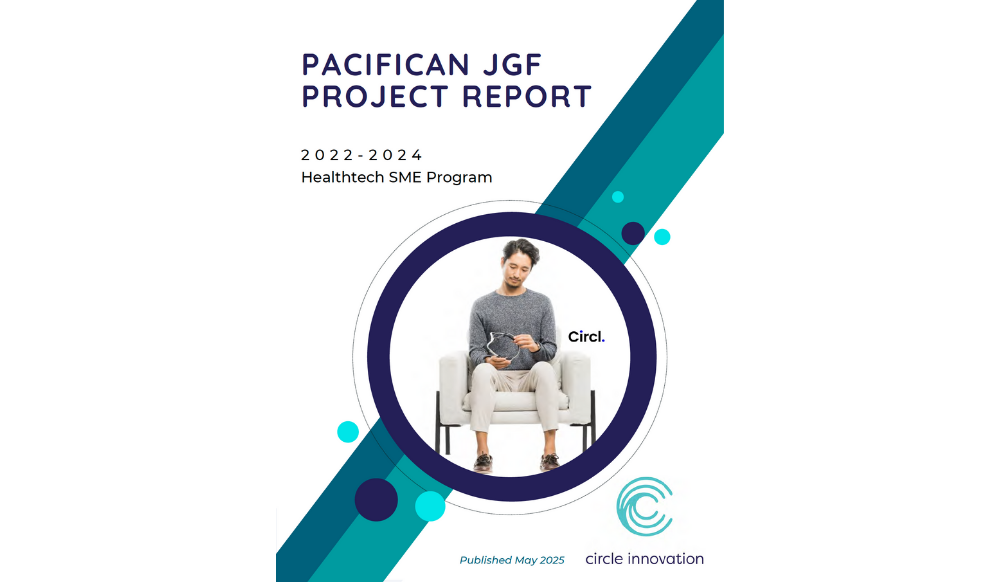VANCOUVER, B.C. – March 3, 2021: Despite typical narratives about older adults’ reluctance to adopt technology, a poll released today by Research Co. and Digital Health Circle found that, during the COVID-19 pandemic, British Columbians 55 and over have been the most satisfied with digital health tools of any age group (86 per cent were very satisfied or moderately satisfied versus 75 per cent and 80 per cent for ages 18- 34 and 35-54 respectively).
The COVID-19 pandemic has spurred both the innovation and adoption of more and more digital health solutions as healthcare providers and consumers were forced to pivot, and virtual care and wellness activities became necessary. Digital Health Circle partnered with Research Co. to better understand how British Columbians, especially older adults, have been using digital health products during the pandemic, in order to help local businesses and healthcare providers better address their consumers’ needs.
“As Digital Health Circle’s work focuses on assisting tech companies to develop products that meet consumers’ needs, we wanted to learn if and how people were using these tools, if they were satisfied and what the barriers or gaps might be,” said Dr. Sylvain Moreno, Chief Executive Officer and Scientific Director, Digital Health Circle. “We learned that as the silver tsunami continues, clearly those older adults have an appetite and an urgent need for digital health tools, which means there is a real opportunity to help improve health outcomes, as well as for product and job creation in B.C.”
Today’s poll is a follow up to the one Research Co. did pre-pandemic, September 18, 2018 to understand how British Columbians were using digital tools for health care.
“The data in our poll refutes the stereotype that older adults, including baby boomers, are averse to technology adoption and avoid using digital health solutions,” said Mario Canseco, President, Research Co. “The high uptake amongst older adults may be in part due to concerns about exposure to COVID-19 in the community, making this group more likely to avoid going to the doctor in person or seeking traditional health care. Older adults also have higher healthcare needs and less transportation access, making digital health solutions very convenient.”
The data also provides two distinct learnings to inform the Provincial Government’s health policy development:
- Government should continue to build on the digital capacity the health sector gained during the COVID-19 pandemic—the data tells us that use of digital health solutions holds a promise to satisfy older adults’ care needs.
- It is now up to Government, including health authorities, to keep their feet on the gas and continue to make these products available in the health care system or incur the frustrations of this cohort, which includes baby boomers.
“This data will help DHC as we assist small tech companies increase their chance of developing the best possible digital health solutions for British Columbians,” said Dr. Moreno. “The survey suggests that older adults want digital health solutions and products to be developed for them at least at the same rate as the general public.”
Other findings included:
- During the pandemic, 51 per cent of British Columbians essentially “migrated” to virtual care. It was even higher for older adults (55+) at 54 per cent.
- Vancouver Islanders are most divided on whether they will keep using digital solutions post pandemic, with 50 per cent saying they will continue to use them, 16 per cent saying they won’t and 34 per cent unsure.
- Higher income residents say they will rely on these tools more post-pandemic: 64 per cent of those earning over $100,000/year versus 42 per cent of those earning under $50,000/year. However, the lowest income group had a higher satisfaction level that higher earners. Digital Health Circle plans to further explore the issue of access in the coming year.
- More than two-in-five British Columbians are relying on digital health solutions, but the way they come into contact with them is different. The 55+ group is more likely to be getting recommendations from their physicians. Word of mouth and ads resonate with Millennials and Generation X.
- There is generally similar use and perspectives on digital health products across ethnic groups and regions, with similar levels of satisfaction. One of the main differences is observed with tools for mental well-being, where adoption is highest among British Columbians of First Nations descent (23 per cent) but drops among those of South Asian (13 per cent), East Asian (8 per cent) and European heritage (7 per cent). Further investigation would be needed to understand if this is due to need, willingness to adopt technologies or another reason.
- The most popular digital health care tools were in the following categories: physical activity and exercise (38 per cent), sleep tracking (14 per cent), nutrition (12 per cent), heart health/blood pressure (11 per cent) and mental well-being (9 per cent). This may be due to availability of apps, so this might not correlate to interest or willingness.
METHODOLOGY
This comprehensive poll of 800 adults in British Columbia was undertaken as an online survey conducted on February 22 and February 23, 2021. The data has been statistically weighted according to Canadian census figures for age, gender and region in British Columbia. The margin of error—which measures sample variability—is +/- 3.5 percentage points, nineteen times out of twenty.
Find our data tables here.
ABOUT DIGITAL HEALTH CIRCLE
Digital Health Circle is an SFU- and AGE-WELL- affiliated not-for-profit that uses a product development-based collaborative approach to build partner capacity so their digital health projects succeed in creating positive health impacts while also helping people find employment by growing B.C.’s digital health economy.
ABOUT RESEARCH CO.
Simply put, we are curious about what people think and the decisions they will make. Some call it public opinion, others call it polling or public affairs. We never compromise facts for profit. Our agenda is the truth. We have a global network of partners in the qualitative, data collection and data visualization specialities.
MEDIA CONTACT
Laura Cropper
Coast Communications and Public Affairs laura@coastcomms.ca
778.323.3827




